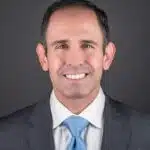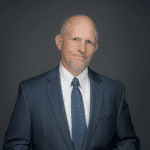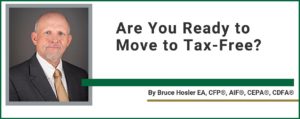Congress has passed the SECURE Act 2.0. Among the many retirement plan changes are new catch-up contribution requirements. Alex Koury from Hosler Wealth Management joins Bruce today to explain.
As you may know, employees aged 50 and over can make “catch-up” contributions to their plans to save more for retirement. Until 2023, these additional contributions could go into the tax-deferred side of a 401(k) plan and be taken as a tax deduction.
However, beginning in 2024, highly compensated individuals’ catch-up contributions may only go into Roth or after-tax plans. Now, the benefit to the retiree is that money will grow tax-free; the taxes are paid on the way in, not the way out. But here’s the caveat, this can result in a significant swing in your 2024 taxes. For example, a $7,500 catch-up contribution will now be taxed instead of a tax deduction. That’s a $15,000 swing. At 23% (federal + state), that could increase your tax bill by $3,450!
We believe that despite this “short-term pain,” there is “long-term gain.” With the Tax Cuts and Jobs Act set to expire in 2026, the likelihood of taxes increasing is high. Having already paid the taxes on this money could save you in the long run. We don’t want to see you with a nasty surprise on next year’s taxes!
For more information about anything related to your finances, contact Bruce Hosler and the team at Hosler Wealth Management.
Call the Prescott office at (928) 778-7666 or our Scottsdale office at (480) 994-7342.
To listen to more Protecting & Preserving Wealth podcast episodes, click here.
Limitation of Liability Disclosures: https://www.hoslerwm.com/disclosures/#socialmedia
Guest Profile

Alex Koury CFP®, CERTIFIED FINANCIAL PLANNER™ professional and Wealth Manager in Scottsdale, has worked in the financial services industry for fourteen years as a financial advisor and Financial Planner. He holds Series 7, 9, 10 & 66 securities registrations– and is a Registered Representative with Commonwealth Financial Network®.
Podcast Host

Bruce Hosler is the founder and principal of Hosler Wealth Management, LLC., which has offices in Prescott and Scottsdale, Arizona. As an Enrolled Agent, CERTIFIED FINANCIAL PLANNER™ professional, and Certified Private Wealth Advisor (CPWA®), Bruce brings a multifaceted approach to advanced financial and tax planning. He is recognized as a prominent financial professional with over 27 years of experience and a seven-time consecutive *Forbes Best-In-State Wealth Advisor in Arizona. Bruce recently authored the book MOVING TO TAX-FREE™ Strategies For Creating Tax-Free Retirement Income And Tax-Free Lifetime Legacy Income For Your Children. www.movingtotaxfree.com.
In the Protecting & Preserving Wealth podcast, Bruce and his guests discuss current financial topics and provide timely answers for our listeners.
If you have a topic of interest, please let us know by emailing info@hoslerwm.com. We welcome your suggestions.
*2018-2024 Forbes Best In State Wealth Advisors, created by SHOOK Research. Presented in April 2024 based on data gathered from June 2022 to June 2023. 23,876 were considered, 8,507 advisors were recognized. Not indicative of advisor’s future performance. Your experience may vary. For more information, please visit.
Transcript
Jon “Jag” Gay: Welcome to the Protecting & Preserving Wealth Podcast. I am Jon JAG Gay with our host Bruce Hosler and our guest today, Alex Koury from Hosler Wealth Management. Alex, welcome to the podcast.
Alex Koury: Thanks, Jon. It’s great to join you and Bruce today to talk about SECURE Act 2.0.
Bruce Hosler: Welcome, Alex. I’m glad to have you join us today as we talk about some of these new requirements. I want to discuss the new mandates regarding Roth catch-up contributions for employees participating in retirement plans.
Jon Gay: Before we get started, which retirement plans are we talking about today, Alex, that have these new catch-up contribution requirements?
Alex Koury: The SECURE Act 2.0 catch-up contribution requirements will specifically apply to most 401(k) plans, 403(b) plans, and 457(b) plans.
Jon Gay: Just so we’re helping our listeners understand who these regulations apply to, what are the requirements to qualify for a catch-up contribution, Bruce?
Bruce Hosler: As most everyone knows, every qualified employee can choose to defer the annual limit from their pay and, “contribute that amount to their retirement plan.” That’s why these plans are called ‘contribution plans’ because the employee is able to contribute to them. The catch-up contribution, though, is limited to employees that are the age 50 or older, so younger employees are not allowed to make catch-up contributions.
Alex Koury: In 2023, the annual deferral limit for all employees is $22,500 per tax year. Employees of all ages can make a contribution in that amount. Employees that are 50 or older can also make a catch-up contribution of $7,500 in 2023. That will allow those employees to make total contributions of $30,000 per tax year.
Jon Gay: These sound like the regular contribution rules for 401(k) plans. What is new with SECURE 2.0, Bruce?
Bruce Hosler: Beginning in 2024 employees that are highly compensated, and for the purposes of this new rule, it specifically means employees earning more than $145,000 in 2023 as wages. They will have to make their catch-up contributions in a new Roth 401(k) and it will not be able to defer those catch-up contributions into the traditional tax-deferred side of the 401(k) plan.
Alex Koury: Now, at first that might sound like not a big deal, but consider what Congress is trying to do. If you defer $7,500 into a Roth 401(k), you’ll have to recognize the income and pay the tax on that contribution amount instead of receiving a tax deduction.
Bruce Hosler: Think about it, that is a taxable swing of around $15,000. Let’s say that you’re in the 20% federal marginal tax bracket, and if you add 3% for the state’s taxes, that could increase your tax bill by about $3,450 that year.
Jon Gay: That is crazy to think about. You’re talking $7,500 on each side to make up that swing of $15,000 that you’re going to have to pay the taxes up front as opposed to deferring them to later. When you explain it that way, Bruce, it does make it sound like a tax increase, doesn’t it?
Bruce Hosler: It is certainly a tax increase in the near term to help Congress bring in more tax dollars for their coffers.
Alex Koury: In today’s environment, we actually feel this is a great opportunity for our clients because it’s going to allow them to save more money in their tax-free Roth 401(k) plans. We just want to bring it to their attention that these rules are mandatory. If you’re participating in a retirement plan and you’re old enough to make catch-up contributions, you could be in for a nasty surprise when you go to prepare your taxes for 2024. If you’re not paying attention, you might think the catch-up amount will keep your taxable income lower like it always has, but that’s not the case starting in 2024.
Jon Gay: All right. Alex, you’re saying it’s going to feel the same to the employee because the money’s taken out of their paycheck like it has been before, but now it’s not going to qualify for a tax-deferred contribution. Instead, it’s going to be taxable income as a Roth 401(k) contribution.
Bruce Hosler: I love this ability to contribute your catch-up deferrals to a Roth 401(k). Don’t get me wrong, because it’s going to allow our listeners to save more money long-term in their tax-free bucket. Ultimately, this will help them big time later in retirement when they will be able to withdraw these funds tax-free from their Roth 401(k).
Alex Koury: Now, we wanted to point out that this is a new mandatory regulation included in the SECURE Act 2.0. Employers with these types of plans and the employees participating in these plans that qualify to make these catch-up contributions will not have a choice where these funds are placed. They will have to be placed in the Roth 401(k) side of the plan.
Jon Gay: That’s a really important point. I’m glad you said that. What about small business owners, Alex, that are not employees of their company but have earned income as a sole proprietor or as a partner of a firm like, I don’t know, me.
Alex Koury: Right now, the language is very specific that this regulation will apply to wages. Business owners that are employees of their companies that are registered as a sub-S corporation and C corporations appear to be affected, and non-employee business owners may not be affected by this law at all.
Jon Gay: Are the retirement plan providers going to be required to provide the 401(k) option if they don’t currently have that as an available option, Alex?
Alex Koury: We don’t have a lot of clarity on this right now, but as it stands, it appears that if a plan does not allow Roth contributions in 2023, that it will have two options next year for 2024. First off, it could begin offering the Roth option for catch-up contributions, which would be mandatory for the highly-paid employees and optional for others. Or, as a second option, it could continue not to allow for Roth contributions and it would not be eligible to offer the catch-up contribution either.
Bruce Hosler: Folks, I wanted to share this information with you so you can begin planning what you will do next year with your catch-up contributions. I did not want you to get caught off guard. The SECURE Act 2.0 encompasses a number of changes in the tax law and we want to help you get out in front of it right now today in 2023.
Jon Gay: Bruce, if I’m understanding you correctly, with this provision in the SECURE Act 2.0, it’s the whole short-term pain long-term gain thing. You might have a little bit more of a tax bill come 2024, but by paying the tax on it upfront, that money’s going to grow tax-free because you’re doing the Roth side of things. Do I have that right?
Bruce Hosler: Absolutely. When we believe that the future tax rates are going to be that much higher, Jon, because after 2026, the Tax Cuts and Jobs Act sunsets, then they’re getting those dollars at a discount. Here’s the thing I wanted to bring to everybody’s attention. Hey, if you’re not paying attention to this, the dollars go out of your paycheck and all of a sudden you think your taxes are going to be the same, and now you’ve got a $3,500 tax bill that you weren’t expecting and you didn’t know was coming and you thought everything was just the same.
Jon Gay: Bruce, if any of our listeners have questions or want to get in touch with you or Alex or the team at Hosler Wealth Management, what’s the best way to find you?
Bruce Hosler: Jon, they can reach us, of course, at the website at https://hoslerwm.com or in Scottsdale at 480-994-7342 or in Prescott, 928-778-7666.
Jon Gay: Alex, Bruce, really important info as always, appreciate your time. We’ll talk to you again in a couple weeks.
Bruce Hosler: Thanks, Jon.
Alex Koury: Thank you, Jon.
Jon: Securities and advisory services offered through Commonwealth Financial Network, member of FINRA/SIPC, a registered investment advisor. Forward-looking commentary should not be misconstrued as investment or financial advice. The advisor associated with this podcast is not monitored for comments and any comments should be given directly to the office at the contact information specified.
Any tax advice contained in this communication, including any attachments, is not intended or written to be used and cannot be used for the purpose of, 1) avoiding federal or state tax penalties or, 2) promoting marketing or recommending to another party any transaction or matter addressed herein. The accuracy, completeness, and timeliness of the information contained in this podcast cannot be guaranteed. Accordingly, Hosler Wealth Management LLC does not warranty, guarantee, or make any representations, or assume any liability with regard to financial results based on the use of the information in this podcast.
Comments are closed.


